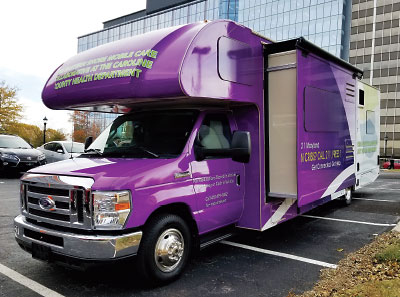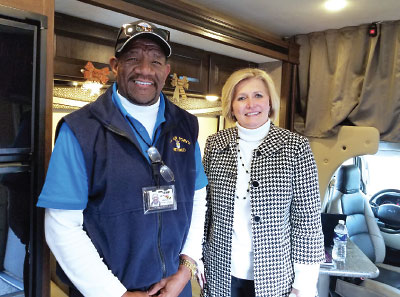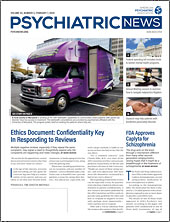On a sweltering 90-degree day last summer, Marylander Joe Johnson (not his real name) rode his lawn mower for several miles down a dusty country road in Caroline County. He was on a mission, his destination a gleaming purple and white RV where he could get treatment for his opioid use disorder (OUD). As Johnson rumbled up to the RV, the door swung open, and Roger McKnight, a U.S. Air Force veteran and retired government employee, greeted him with a warm welcome and a smile.
“We heard you coming,” McKnight said.
McKnight is a peer recovery specialist, and the RV is the Caroline County Mobile Health Unit. McKnight drives the unit to rural parts of Caroline County so people with OUD who otherwise would not be able to access care can receive treatment.
The mobile health unit is funded by several agencies and organizations: the Health Resources and Services Administration of the U.S. Department of Health and Human Services, the University of Maryland School of Medicine, the Maryland Department of Health and Behavioral Health Administration, and the Caroline County Health Department. It is outfitted with a comfortable seating area, the equipment necessary for urine screens, and a separate telehealth counseling room with a camera and a monitor.
At their visits, patients talk to McKnight, receive a urine screen administered by a nurse, and have a telehealth appointment with a psychiatrist affiliated with the University of Maryland. The telehealth visit takes place over a secure connection that sends data over a dedicated wireless hotspot. Because there is no desktop or laptop computer involved, there are fewer parts to lose—no mouse or keyboard, no hard drive with sensitive information that could be lost or stolen. Instead, patients’ medical records are stored electronically at the Caroline County Behavioral Health office at the Caroline County Health Department. At the end of each appointment, the psychiatrist electronically sends any necessary prescriptions to a nearby pharmacy for the patient to pick up on the way home. Prescriptions cost $1.
More than 80 patients have received care through the mobile health unit so far, and the feedback has been positive, said Eric Weintraub, M.D., head of the Division of Addiction Research and Treatment and an associate professor of psychiatry at the University of Maryland School of Medicine. Weintraub is one of the psychiatrists who treats patients through the mobile health unit.
“We are gathering data to quantify it, but anecdotally I can say [patients]are pleased with the ability to connect with providers through telehealth. They feel like the connection is just as good as being seen in person,” Weintraub told Psychiatric News. “There are high retention rates, which also suggest patients are satisfied with the service.”
A major element of the unit’s success is the peer counseling McKnight provides, Weintraub said. “Roger is the heart and soul of the program in many ways.”
McKnight said he tries to make patients feel welcome and shares his own experience with treatment and recovery if they ask.
“There is no stigma. We’re all family here,” McKnight said. “People question how I did it, so I tell them. It took me a long time to make the decision [to seek treatment]. But once you make the decision, you have to have a safe environment where you can get help.”
Another key to the program’s success is the support of the communities within the county, said Terri L. Ross, L.C.S.W.-C., L.A.A., program director at Caroline County Behavioral Health. To that end, she works with the towns to arrange times, dates, and locations where the mobile health unit can park.
“It’s a very small community, and everyone knows each other,” Ross said. “We meet with the towns to get permission to come into the area, and it is all done with their consent.” The team’s strategy is to go not only where people with OUD have trouble accessing care, but also where they are at high risk for a dangerous relapse, such as the county’s detention centers.
“Dealers are usually waiting right there for them to come out,” McKnight said. “Instead people can come right to us. [Our presence] is well understood by local law enforcement, probation officers, social services, and corrections, and we have their support.”
However, there is no visible police presence near the mobile health unit, McKnight said. “If people see them, they won’t come because they’re afraid they’ll get arrested. We can call the police if we need to, and they’ll come very fast.”
McKnight and Johnson spoke again at the end of Johnson’s appointment. McKnight answered Johnson’s questions and then made a small suggestion.
“I only have piece of advice: Maybe you could get a muffler?”
With that, Johnson hopped back onto his lawn mower, rode to the pharmacy for his prescription, and then rode home. ■
More information about the program is posted
here.


